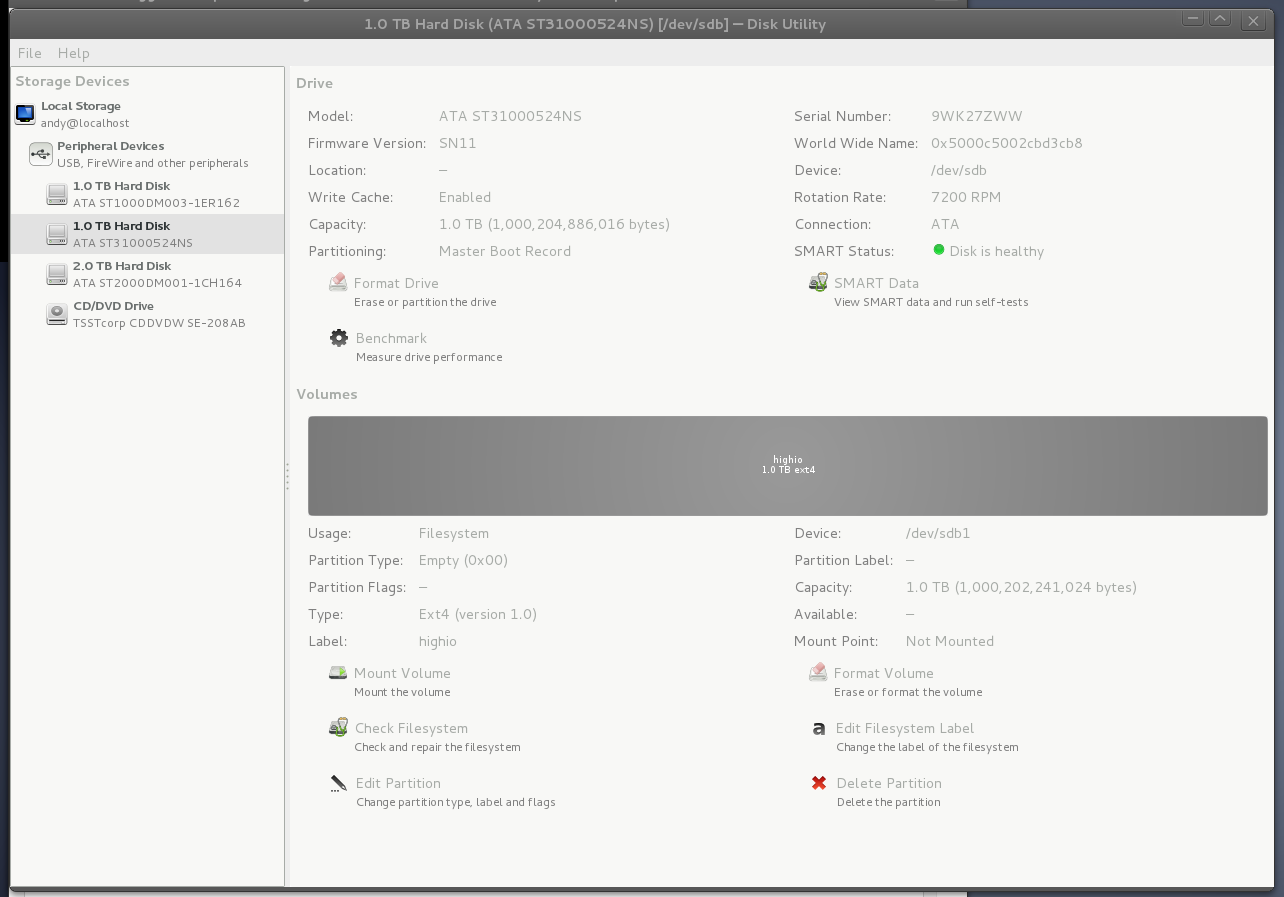I've got a box with two harddrives -- sda (160 gb) has debian and sdb has CentOS (500 gb). I never use CentOS and I need the space for debian.
sudo fdisk -l
WARNING: GPT (GUID Partition Table) detected on '/dev/sda'! The util fdisk doesn't support GPT. Use GNU Parted.
Disk /dev/sda: 160.0 GB, 160041885696 bytes
255 heads, 63 sectors/track, 19457 cylinders, total 312581808 sectors
Units = sectors of 1 * 512 = 512 bytes
Sector size (logical/physical): 512 bytes / 512 bytes
I/O size (minimum/optimal): 512 bytes / 512 bytes
Disk identifier: 0x00000000
Device Boot Start End Blocks Id System
/dev/sda1 1 312581807 156290903+ ee GPT
Disk /dev/sdb: 500.1 GB, 500107862016 bytes
255 heads, 63 sectors/track, 60801 cylinders, total 976773168 sectors
Units = sectors of 1 * 512 = 512 bytes
Sector size (logical/physical): 512 bytes / 512 bytes
I/O size (minimum/optimal): 512 bytes / 512 bytes
Disk identifier: 0x0007e385
Device Boot Start End Blocks Id System
/dev/sdb1 * 63 32772599 16386268+ 83 Linux
/dev/sdb2 32772600 40965749 4096575 83 Linux
/dev/sdb3 40965750 43006004 1020127+ 82 Linux swap / Solaris
/dev/sdb4 43006005 976768064 466881030 5 Extended
/dev/sdb5 43006068 976768064 466880998+ 83 Linux
We're in 'luck' since we're only interested in killing sdb, and gparted wants a Display (this is done remotely).
So
sudo fdisk /dev/sdb
Command (m for help): d
Partition number (1-5): 1
Command (m for help): d
Partition number (1-5): 2
Command (m for help): d
Partition number (1-5): 3
Command (m for help): d
Partition number (1-5): 4
Command (m for help): w
The partition table has been altered!
Calling ioctl() to re-read partition table.
Syncing disks.
So did it work?
sudo fdisk -l
WARNING: GPT (GUID Partition Table) detected on '/dev/sda'! The util fdisk doesn't support GPT. Use GNU Parted.
Disk /dev/sda: 160.0 GB, 160041885696 bytes
255 heads, 63 sectors/track, 19457 cylinders, total 312581808 sectors
Units = sectors of 1 * 512 = 512 bytes
Sector size (logical/physical): 512 bytes / 512 bytes
I/O size (minimum/optimal): 512 bytes / 512 bytes
Disk identifier: 0x00000000
Device Boot Start End Blocks Id System
/dev/sda1 1 312581807 156290903+ ee GPT
Disk /dev/sdb: 500.1 GB, 500107862016 bytes
255 heads, 63 sectors/track, 60801 cylinders, total 976773168 sectors
Units = sectors of 1 * 512 = 512 bytes
Sector size (logical/physical): 512 bytes / 512 bytes
I/O size (minimum/optimal): 512 bytes / 512 bytes
Disk identifier: 0x0007e385
Device Boot Start End Blocks Id System
Time to create a new partition
sudo fdisk /dev/sdb
Command (m for help): n
Partition type:
p primary (0 primary, 0 extended, 4 free)
e extended
Select (default p): p
Partition number (1-4, default 1):
Using default value 1
First sector (2048-976773167, default 2048):
Using default value 2048
Last sector, +sectors or +size{K,M,G} (2048-976773167, default 976773167):
Using default value 976773167
Command (m for help): w
The partition table has been altered!
Calling ioctl() to re-read partition table.
Syncing disks.
Did it work?
sudo fdisk -l /dev/sdb
Disk /dev/sdb: 500.1 GB, 500107862016 bytes
81 heads, 63 sectors/track, 191411 cylinders, total 976773168 sectors
Units = sectors of 1 * 512 = 512 bytes
Sector size (logical/physical): 512 bytes / 512 bytes
I/O size (minimum/optimal): 512 bytes / 512 bytes
Disk identifier: 0x0007e385
Device Boot Start End Blocks Id System
/dev/sdb1 2048 976773167 488385560 83 Linux
Create a file system:
sudo mkfs.ext4 /dev/sdb1
mke2fs 1.42.5 (29-Jul-2012)
Filesystem label=
OS type: Linux
Block size=4096 (log=2)
Fragment size=4096 (log=2)
Stride=0 blocks, Stripe width=0 blocks
30531584 inodes, 122096390 blocks
6104819 blocks (5.00%) reserved for the super user
First data block=0
Maximum filesystem blocks=4294967296
3727 block groups
32768 blocks per group, 32768 fragments per group
8192 inodes per group
Superblock backups stored on blocks:
32768, 98304, 163840, 229376, 294912, 819200, 884736, 1605632, 2654208,
4096000, 7962624, 11239424, 20480000, 23887872, 71663616, 78675968,
102400000
Allocating group tables: done
Writing inode tables: done
Creating journal (32768 blocks): done
Writing superblocks and filesystem accounting information: done
Let's automount it:
mkdir /home/me/scratch
and edit /etc/fstab
/dev/sdb1 /home/me/scratch ext4 defaults 0 2
You're done.








